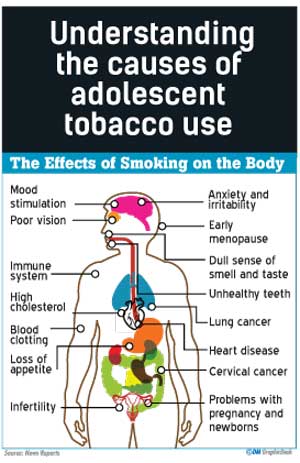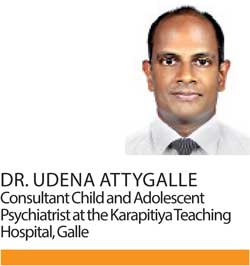15 Dec 2017 - {{hitsCtrl.values.hits}}
 Regardless of how well you understand the outcomes of tobacco use, you still see a considerable number of cigarette smokers almost everywhere you go. Earlier this year, the Youth Tobacco report compiled by the US Centers for Disease Control and Prevention (CDC), slotted Sri Lanka as the country with the lowest prevalence of teen smoking which amounts to 1.7%. The report however cautioned that “young people who begin to smoke at an earlier age are more likely than those who start at older ages to develop long-term nicotine addiction.”
Regardless of how well you understand the outcomes of tobacco use, you still see a considerable number of cigarette smokers almost everywhere you go. Earlier this year, the Youth Tobacco report compiled by the US Centers for Disease Control and Prevention (CDC), slotted Sri Lanka as the country with the lowest prevalence of teen smoking which amounts to 1.7%. The report however cautioned that “young people who begin to smoke at an earlier age are more likely than those who start at older ages to develop long-term nicotine addiction.”
As tobacco use is responsible for a significant number of deaths each year and impacts the health of every member of our society, it is imperative to discuss how and why adolescents drift towards the consumption of tobacco. Consultant Child and Adolescent Psychiatrist at the Karapitiya Teaching Hospital, Galle, Dr. Udena Attygalle joins this week’s edition of Health Capsule factors, as we attempt to demystify the psychological factors, associated with tobacco use.
According to Dr. Attygalle, the chemical changes in the brain caused by tobacco smoking are a complex process. “Exposure to nicotine changes the way your brain functions. The balance of certain chemicals, in your brain starts to change. This change causes you to want more of nicotine which in turn can later cause addiction,” he said.
Age of curiosity
Even though many people are aware of how the use of tobacco can harm the body, less people are aware of how and why tobacco addiction works. According to Dr. Attygalle, it isn’t easy to specify or label these reasons as to why each smoker will take to using tobacco. “Young people just experiment with a lot of things. Most of them choose tobacco as it is easily available. Most of these youngsters who experiment don’t end up becoming chain smokers. But for some the vulnerability is more,” Dr. Attygalle noted. “Some individuals have a genetic vulnerability to become addicted to tobacco. However the majority of youngsters are known to experiment with many substances and not just tobacco alone.”
 Recent research also seems to echo this theory. According to a study conducted by researchers from University of Michigan, a previously dismissed genetic mechanism has been found responsible for nicotine dependence. Their research findings show that specific genes and micro RNA (a type of small RNA molecules that help refine gene expression) play a vital role in determining how nicotine dependence and withdrawal responses are developed.
Recent research also seems to echo this theory. According to a study conducted by researchers from University of Michigan, a previously dismissed genetic mechanism has been found responsible for nicotine dependence. Their research findings show that specific genes and micro RNA (a type of small RNA molecules that help refine gene expression) play a vital role in determining how nicotine dependence and withdrawal responses are developed.
Responding to the question of tobacco acting as a gateway drug encouraging youth to gamble into the use of other drugs, Dr. Attygalle said this is a theory which has been debated over the years. “For example, some believe that Cannabis can act as a gateway drug rather than tobacco. However it’s important to note that people who are addicted to other substances are usually smokers of tobacco. For instance someone who is addicted to alcohol is more likely to smoke tobacco as well,” he added.
Asked if the use of tobacco can affect the mental growth and overall mental health of adolescents, Dr. Attygalle said that a number of factors should be weighed with regard to the growth of a teenager’s brain. “It is not necessarily the case that the use of tobacco would affect the mental growth of teenagers. But the adolescent brain is still undergoing changes. Any substance-not just tobacco-can cause changes in the brain. It has been established that the use of cannabis causes fundamental changes in brain circuitry and it can have repercussions later on,” explained Dr. Attygalle.
What is Tobacco?
Tobacco is found in many different forms, including cigarettes, cigars, pipe tobacco, snuff, and chewing tobacco. It contains the addictive drug nicotine (also found in e-cigarettes).
What is Nicotine?
Nicotine, a highly addictive stimulant, is absorbed into the bloodstream when tobacco or nicotine products are chewed, inhalled, or smoked.
 Behavioural changes
Behavioural changes
Speaking of suspected behavioural changes caused by tobacco consumption, Dr. Attygalle believes it is important to monitor the overall behaviour of adolescents.
“Often there’s an underlying factor-besides the addiction to nicotine-that drives teenagers to pick up the habit of smoking in the first instance. A craving for smoking will develop due to dependence. If a smoker doesn’t get enough nicotine, they become anxious and crave for nicotine. That could be one sign,” he said.
“Most children smoke to feel good, or due to pressure from peer groups or even to reduce stress. Being aware of your child’s behaviour in general, rather than looking for behavioural clues associated with smoking is what we should focus on. Concentrating on the reasons as to why they are smoking rather than looking out for behavioural changes is advisable,” Dr. Attygalle explained.
According to Dr. Attygalle, those suffering from certain illnesses such as depression or anxiety are more inclined towards smoking tobacco. “Since tobacco is freely available, if someone is feeling anxious or depressed, they will find a temporary relief from nicotine. In addition to these illnesses, those with illnesses such as schizophrenia are more likely to smoke as they will seek relief from their symptoms,” he further added.
Ways to quit
Stopping smoking is easier said than done, according to many who have attempted to quit the habit. “This depends on how addicted a person is to smoking,” said Dr. Attygalle. “If it is a chain smoker, they can’t get rid of this habit easily. For young people, they need to develop and understand the threats of tobacco use for which there are many effective campaigns carried out. It’s also important that they develop social skills and life skills. Being confident enough to resist the urge to smoke is the kind of skill which needs to be inculcated in youth.
“When it comes to peer pressure, they have to build confidence in knowing how to say no. Their assertiveness and ability to advocate for non-smokers are vital aspects of this process. In this regard both parents and teachers have equal responsibility to educate their children,” he added.
Dr. Attygalle didn’t fail to highlight the importance of building these values in young minds. “Adolescents usually act as agents of change. If one adolescent is capable of changing another peer, it has a kind of a ripple effect,” Dr. Attygalle underscored.
 “For serious addiction, you need to seek help from adults. There are various models of breaking free from addiction. There are medications available as well as support programmes designed to help those who need to quit smoking.
“For serious addiction, you need to seek help from adults. There are various models of breaking free from addiction. There are medications available as well as support programmes designed to help those who need to quit smoking.
Despite increasing evidence that tobacco use is detrimental not only to your physical health, but also to your mental health, people don’t seem to heed any of these warnings.
“There are various reasons connected with the use of tobacco. If your social circumstances are falling apart, you are more likely to start depending on smoking. This isn’t a direct connection, but there are countless issues associated with smoking. For instance, if someone has to continue with smoking, it affects his or her life. This can in turn lead to depression, anxiety and other illnesses. Not just tobacco, but any form of substance abuse can cause a significant change in one’s life,” Dr. Attygalle said highlighting the importance of understanding the risks associated with the toxic tobacco.
23 Dec 2024 54 minute ago
23 Dec 2024 1 hours ago
23 Dec 2024 1 hours ago
23 Dec 2024 3 hours ago
23 Dec 2024 3 hours ago